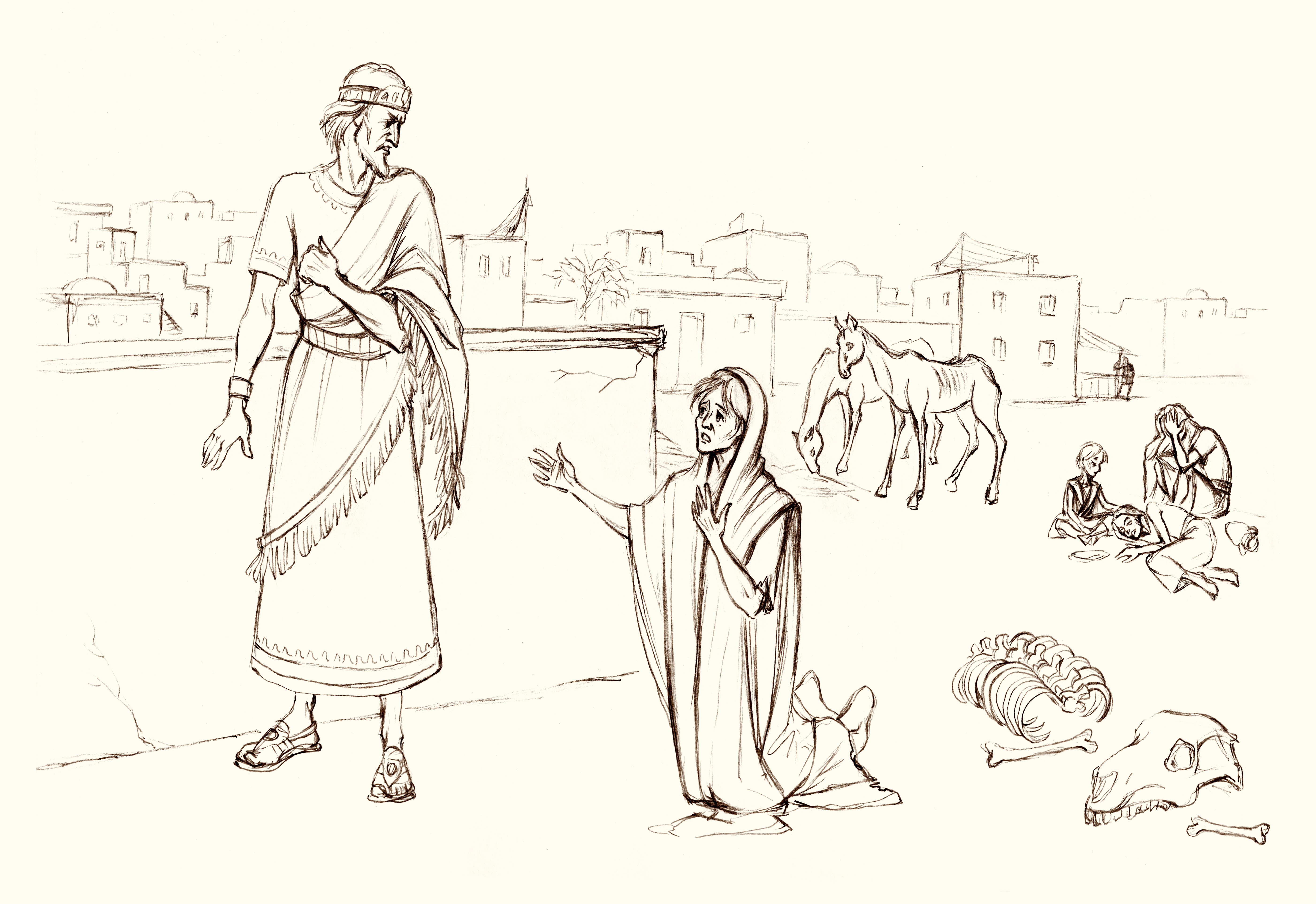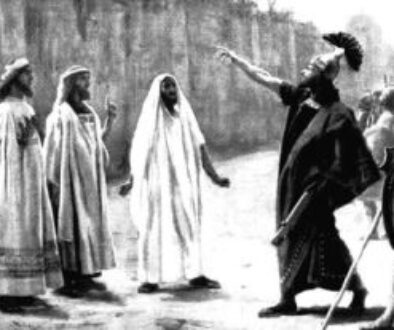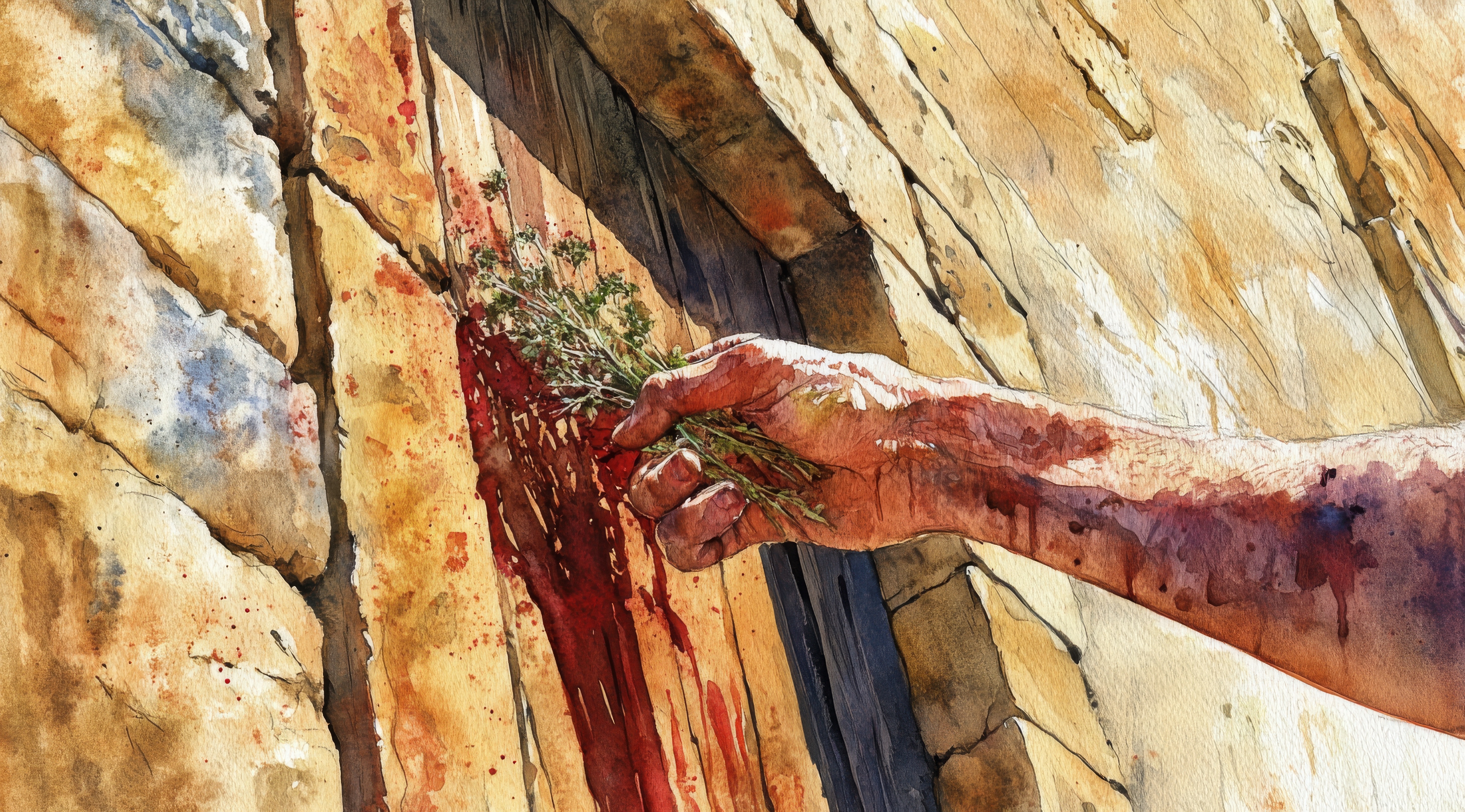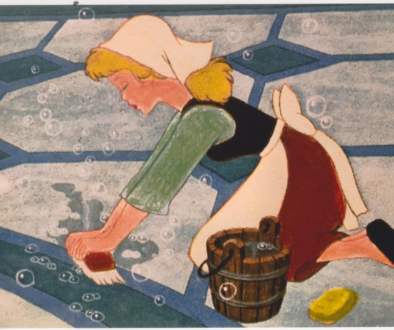2 Kings 6-7 Siege of Samaria
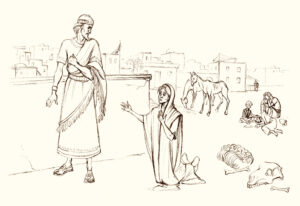
This story involves Elisha being a conduit for the Lord. It also shows man’s depravity during the siege of Samaria. Be warned. There are rough parts ahead.
Other than Jesus’ crucifixion, I think this is one of the most heart-rending stories for me as a mother. It reminds me of the story of Solomon and the two prostitutes. But its actions are an absolute reversal of the love the mother showed for her child in Solomon’s story.
While thinking on this, I have to put stories of child sacrifice up there with this one regarding heart rending. I have SO MANY questions, but the biggest on is HOW? How could a mother do this? I have never been is such dire straights as they were though, so I have no right to condemn them. I will leave that judgment in the Lord’s hands.
I think it interesting too that the Syrians stopped “raiding” Israel, but here they are besieging the capital city. What made one action alright with them and the other not? I don’t know if I will ever answer that question. Maybe this “Ben-hadad” is a different one. That seems to be the popular name for the king of Syria. Let’s rejoin our journey through the stories of the bible and see where the Spirit takes us today.
♥ ♦ ♥
Ben-hadad, king of Syria is new to the throne. His predecessor had decided to leave Israel alone. “It is a sign of weakness to leave your enemies strong enough to turn on you” this Ben-hadad reasons. “I will NOT be seen as a weak king!” he vows.
When spring comes his first year on the throne, Ben-hadad makes his move. He gathers all the fighting men of his kingdom together. “We are going after Israel. And we will strike at her heart. Her capital city; Samaria. And we will not leave until we see it in ashes and ruin.”
A cheer goes up from the ranks. They are ready to follow their new king, wherever he leads them.
The march to Samaria begins. There are smaller cities on the path to Samaria that easily fall under the weight of so great a force. As they fall, they are plundered and their inhabitants put to death. Syria is cutting a wide swath of destruction on its way to its final target.
As the army advances through the countryside, the inhabitants of Samaria learn of the final destination and begin fortifying their city as best as they can. Before the army reaches Samaria, the gates are barred and the ramparts are filled with soldiers, ready to defend her to the death.
Syria surrounds Samaria on every side. She is like an island in the midst of the sea; a sea of invaders. Nothing and no one goes out or comes in. This makes for great security measures within the city, but is terrible for maintaining its strength. With the blockade, no food comes in, no refuse is removed, no reinforcements can reach them, and no messages for help can be sent. Samaria is on its own.
Daily, the army of Syria challenges the walls and gates of Samaria. Initially, they pushed hard to make a breech, but their efforts were repelled each time. Boiling oil rained down on them from the walls and archers picked men off. Now, their daily ‘attacks’ amount to marching in front of the gates and blowing the trumpets. Their strategy now is to starve the people out. Syria has plenty of stores and time to wait them out.
King Jehoram paces his throne room and the walkways of the wall. He is desperate. It has been months since the army of Ben-hadad took up position around his city. Every day there is less and less to eat. Only the richest can eat now. He even struggles to put food on his table.
He begs God for help but He doesn’t answer him. In the beginning, he asked help from Baal and the Asherah, but has put that aside now. As of two days ago, he is wearing sackcloth beneath his royal robes. He hides it so that the people don’t see how desperate he is.
The prophet Elisha is trapped within the walls of Samaria along with everyone else. Jehoram prays that he will do something to save them; plead with the Lord for deliverance. So far, there has not been one word from Elisha.
Within the city, the people are desperate. Hunger gnaws at them continually. They scavenge for food anywhere they can, but come up with little. Extreme measures of survival are coming out in the people.
In a little house near the wall, live two women with a child each. They have been friends for years. They once were temple prostitutes but both decided to keep their children conceived in service. Their boys are close to two years old. It is heartbreaking to watch their children grow thinner with each passing day. Neither mother has any milk left to provide needed nourishment. Even if they had milk, it would hold nothing useful for their sons, as they have nothing to eat either.
One morning, things are about as bleak as they can get when one of the women makes a suggestion. A HORRIBLE suggestion brought about only by absolute desperation.
“We are starving to death. Our sons are starving as well. We cannot go on like this!”
“And what would you have us do? I see no way out.”
“There is one way to prolong our lives.”
“What might that be?”
“Our sons are barely alive. I cannot stand to see them suffer so. I know it is hard, but this is my proposal. We eat our children.”
“WHAT!”
“Hear me out. We can probably have more children when all this ends, but our sons cannot survive without us. Either they die and preserve our lives or we all die.”
“Give me time to think about it.”
Both mothers bring their sons onto their laps and spend time talking with them. Tears course down the face of the reluctant mother, while the other watches. Her heart hurts too, but she has already made her plans. After an hour of trying to find hope in the face of her lethargic starving child, the reluctant mother surrenders.
“There is nothing else that we can do” she tells her housemate.
“We will eat your son today, so that you won’t have to be in pain any longer. And we will eat my son tomorrow.”
They scour the house and surrounding yard for anything that will burn. Once they have enough, they kindle a fire, put water in the pot and prepare it for cooking. The reluctant mother looks at her son and then the pot.
“I can’t put him in. He is still alive. I don’t want him to die screaming in pain.”
“We won’t put him in alive. He is so near death already; all you have to do is hold his face to your chest. He will pass on hearing your heartbeat and smelling your scent. I’ll help you hold him so he won’t suffer.”
The mother does as instructed. She puts her son’s face between her breasts and holds him fast. He tries with what little strength he has to pull away, but she holds him tightly. Tears stream down her face as she feels the life leave him. When she feels his body completely devoid of movement, she releases him. Her housemate takes him from her and prepares him for the pot.
With amazing skill and fortitude, she removes the meat from the child’s bones and drops it into the boiling water. When she has finished, there is nothing but skin and bone remaining. She hurries around the back of the house and buries his remains.
When the meat is fully cooked, both mothers and the one remaining child eat in silence. Both mothers recognize the cost of this life sustaining meal. Tears flow down the mother’s face. She forces each bite past the lump in her throat. When the last morsel is gone, the mother of the meal goes to her pallet and cries herself to sleep. She prays for tomorrow to come.
Day follows night, just like any other day. The pain over losing her child isn’t gone, but she feels stronger. “He is a part of me now, and will be until the day I pass on” she consols herself. As she rises, she plans how she will help her housemate as they prepare her child for eating. “I suppose I will have to be the one to prepare the meat for the pot. I can be as strong for her as she was for me” she tells herself.
As the day begins, she attributes the silence in the house to the loss of her son’s life. She misses his little noises, the sound of his feet, even the cry of his hunger. After an hour or so, she notices that there isn’t any sound of the other child living in the house. She looks to her housemate and sees her arms empty. This is confusing.
“Where is your son? Did he die in the night?”
The other mother says nothing. She averts her eyes.
“Where is he? What have you done with him?”
“He must be out playing” she finally answers.
He is too young to be out playing by himself. Neither of them would ever have permitted this. But the bereft mother doesn’t push; for now.
As the day wears on, hunger begins to set in. The bereft mother goes to the one who hatched the plan to begin with. “It is time to eat your son. Where is he?”
“He’s not here.”
“What do you mean ‘He’s not here’? We are supposed to eat him today. That is what you said. Where is he?”
The mother of the living child refuses to answer. For hours her housemate tries to get an answer from her, but nothing will pry the answer from her lips.
The bereft mother happens to look out the window and notices the king walking on the ramparts of the wall near their home. She grabs her head covering and runs outside. She calls out to him for help.
Jehoram paces the walkway today, silently crying out to the Lord for salvation when he hears someone calling to him.
“Help, my lord, O king!” (2 Kings 6:26).
The king looks down and sees a woman addressing him. He replies to her with a voice heavy with sorrow and regret. “If the Lord will not help you, how shall I help you? From the threshing floor, or from the winepress?” (2 Kings 6:27).
He takes a deep breath and readies himself to hear her need. “What is your trouble?” (2 Kings 6:28a).
Without hesitation, she lays her story out before the king. “This woman said to me, ‘Give your son, that we may eat him today, and we will eat my son tomorrow.’ So we boiled my son and ate him. And on the next day I said to her, ‘Give your son, that we may eat him.’ But she has hidden her son” (2 Kings 6:28b-29).
The king’s heart tears within him at what he hears! He can’t hold the anguish in. He falls to his knees, grabs his royal robes, and rips them as he lets out a strangled cry of grief.
The king’s cry has turned eyes on him. Clearly evident under his royal robes is sackcloth. This calls to the people’s hearts. The fact that their king has been seeking the Lord on their behalf is on display for all to see. All those who see him wait in silence, waiting while their king regains his composure. Even the woman seeking his help waits silently.
As the king sobs, anger begins to rise in him. “Why has the Lord let this happen? Why hasn’t Elisha intervened on our behalf? How can I call myself a king when I can’t even protect the most innocent of my people?” He continues to berate himself in his mind and heart until he reaches a pinnacle of anger.
He stands to his feet. “Enough is enough” he cries within himself. To the people, he makes a promise. Eyes fierce with anger, he cries out; “May God do so to me and more also, if the head of Elisha the son of Shaphat remains on his shoulders today” (2 Kings 6:31).
As soon as he finishes speaking, he turns and calls a nearby messenger to his side. “Go and find Elisha. Bind him and bring him here to me.”
The messenger bows and quickly descends the ladder and begins the short journey to the home where Elisha is staying.
As the king is proclaiming his vengeance against Elisha, he is sitting in the house of one the city elders. Several more of the elders are with them. They are just as hungry and weary as the rest of the people.
The Lord speaks to Elisha concerning the king’s words. Elisha makes the king’s intentions known to all in the house, before the feet of the messenger reach them. And he gives instructions as to how to proceed.
“Do you see how this murderer has sent to take off my head? Look, when the messenger comes, shut the door and hold the door fast against him. Is not the sound of his master’s feet behind him?” (2 Kings 6:32).
While Elisha is still speaking, the king’s messenger stands before Elisha, accusing him. He has none to stand with him, and those in the house have barred any other from entering.
“This trouble is from the Lord! Why should I wait for the Lord any longer?” (2 Kings 6:33) the messenger cries out.
Elisha is not bound by the messenger. The elders of the city will not permit it. Instead, Elisha and all those with him bring the messenger to the king. The king and the captain of his guard have come down from the rampart and Elisha stands face to face with them.
“Hear the word of the Lord: thus says the Lord, Tomorrow about this time a seah of fine flour shall be sold for a shekel, and two seahs of barley for a shekel, at the gate of Samaria” (2 Kings 7:1).
The captain scoffs at Elisha’s words. “If the Lord himself should make windows in heaven, could this thing be?” (2 Kings 7:2a).
Elisha looks him straight in the eyes. With a stern voice he proclaims the Lord’s judgment on him. “You shall see it with your own eyes, but you shall not eat of it” (2 Kings 7:2b).
As impossible as it sounds, the king knows better than to argue with Elisha. He lets him go; for now. Tomorrow will be a different thing, if what he says doesn’t come to pass.
The bereft mother receives no remedy for her complaint. She has to return to her home, just like everyone else. She knows that she should hold out faith for Elisha’s words to come to pass, but she has no hope left in her heart. “IF this does happen as Elisha says, all I would have had to do was hold on two days longer” she tells herself. She doesn’t even look for her housemate and her child. She goes straight to her pallet and waits for morning. It will either condemn, or vindicate her.
Outside the city of Samaria is a group of four lepers. They are as hungry and desperate as those in the city. They have been trapped against the wall since the day the Syrian army took up their positions. They are nothing more that skin and bones themselves. They are desperate. They refuse to let another day go by without doing something! Anything is better than this.
“Why are we sitting here until we die? If we say, ‘Let us enter the city,’ the famine is in the city, and we shall die there. And if we sit here, we die also. So now come, let us go over to the camp of the Syrians. If they spare our lives we shall live, and if they kill us we shall but die” (2 Kings 7:3-4).
As the lepers are making up their minds to go to the camp of the Syrians, the Syrians hear the sound of hundreds of hoofbeats. They are terrified! The commanders are certain they know the source of the sound. “Behold, the king of Israel has hired against us the kings of the Hittites and the kings of Egypt to come against us” (2 Kings 7:6).
“Run for your lives” is the words filling every ear of the entire camp.
Men scramble out of their tents with noting but the clothes on their backs and the fear in their hearts to accompany them. Pots prepared for cooking are left on unignited fires, armor is left laying on the ground, tent doors flung or ripped open flap in the wind, and animals stand unattended.
No one else hears anything. No sound of horses’ hooves, no sound of the scramble of an entire army of soldiers, not even the sounds of them crashing through the brush on their way to ‘safety’. When the lepers make their way towards the Syrian army’s camp, they have no idea what they are about to find.
Twilight has taken full hold of the sky. The sun has finished its work for the day. The group of lepers stand together at the edge of the camp. They expect to be discovered at any moment. They wait to see what fate their discovery will bring. After several minutes, they tire of waiting. They look at one another and decide as a group to move on in.
“We will surrender to the first soldier we see.”
They advance slowly, calling out softly so as not to be descended upon by a large force.
“We are here to surrender.”
No one answers their call. They move deeper into the camp. Nothing stirs but the wind. They look to one another in confusion. “Where is everyone?”
They decide to split up and have a better look. After several minutes they all rejoin the group to discuss their findings.
“No one is here! They have all left.”
“And they left EVERYTHING behind!”
“Do you think they are out on maneuvers and are coming back later?”
“I don’t think so. Their armor and swords are lying on the ground. They would need those on maneuvers.”
“What should we do?”
“I don’t know about the rest of you, but I’m going to find something to eat! That’s why we came in the first place.”
They all agree and rush together into one on the many barracks tents. Inside they find silver, gold, clothing and plenty to eat. They stuff themselves full first; laughing at their good fortune all the while. Once their bellies are full, they grab the treasures they have found and hurry to the forest to bury them.
“I want more” says one of them, and they all go charging back into the camp to find more treasures. They loot a second tent and bury its contents near where their first bounty is hidden.
As the group stands and looks over their burial sites, their conscience begin to burn. “We are not doing right. This day is a day of good news. If we are silent and wait until the morning light, punishment will overtake us. Now therefore come; let us go and tell the king’s household” (2 Kings 7:9).
It was quickly agreed and the four set off for the gates of Samaria. When they arrive, they don’t even try and get in. They begin calling out to the guards inside.
“Shalom to the gate” they repeat over and over until someone answers them.
“Who are you and what do you want?”
“We are a group of lepers that live outside the gate. We have news for the king’s household.”
“What news could lepers hold that is important enough to bring to the king?”
“Listen to our news and decide yourselves if it is worth of bring to the king.”
“Speak your news then.”
“We came to the camp of the Syrians, and behold, there was no one to be seen or heard there, nothing but the horses tied and the donkeys tied and the tents as they were” (2 Kings 7:10).
“Word will be sent to the king right away!”
A runner is dispatched immediately to the palace. He shares the news exactly as he heard it with the guard at the door. The guard hurries to the king’s own chamber and relay the news to his steward.
Overhearing the conversation, the king nearly jumps from his bed and starts pacing the floor. He stops and shakes a finger at his servant, sharing his conclusions of the Syrian’s actions.
“I will tell you what the Syrians have done to us. They know that we are hungry. Therefore they have gone out of the camp to hide themselves in the open country, thinking, ‘When they come out of the city, we shall take them alive and get into the city’” (2 Kings 7:12).
The king’s second servant wants with all his heart to believe this good news. “If this is true, we are saved” his heart cries out within him. But he has to convince the king to allow him to investigate the truth of the matter.
“Let some men take five of the remaining horses, seeing that those who are left here will fare like the whole multitude of Israel who have already perished. Let us send and see” (2 Kings 7:13).
King Jehoram paces for a bit more before finally relenting. “Go and see” (2 Kings 7:14) he says. He wants to believe, but knows that he has to protect his people. “If we open the doors without knowing for certain, it could be the death of us all.”
Two horses are saddled and the best horsemen in Samaria mount them. The gate is opened wide enough to let them pass, then closed and barred again. The riders make their way through the forests and valleys and every conceivable hiding place; all the way to the Jordan River. There is not a Syrian soldier in sight. What they do see speaks louder than any words can. All the way from the camp to the Jordan are discarded pieces of armor, equipment and clothing. It is as though anything that could slow them down in their haste was dropped along the way. Those who had anything in their hands, or were weighted down with armor from being on guard, discard it along the way.
After seeing this evidence, they are convinced that the danger is gone. As the sun just beginning to chase away the deepest night, they hurry back to tell the king. As they near the gate, they call out. The gate swings open in front of them and then closes behind them again. The continue riding through the streets until they reach the palace.
Jehoram meets them at the base of the stairs. “What did you find?”
“The Syrians are gone! They have fled in fear, leaving everything behind.”
The king sends the captain of the guards to the front gate. He calls out; “Open the gate! The Syrians are gone and they have left us spoils” as he makes his way across the city.
There is a mob at the gates before he even arrives. The gatekeepers push the people back so they can open them. In the rush to get to the food waiting in the camp, the people trample the captain of the guard under foot. He lays dying as the people rush to the bounty promised to them by the Lord through the mouth of Elisha. The last thing the captain sees in this life is the people rejoicing over what they find.
Samaria has so much food now that it is nearly as plentiful as air. No one will go hungry again for a LONG time. At least not physically.
The mother of the child who was eaten rises from her bed after most of the people of Samaria are already scavenging the camp. She walks out to see people rejoicing over the amount of food they have now. She walks as though carrying a ton of stones on her shoulders. “Only two days” she cries as she drags herself to the camp. “Two days difference. If I had held out two more days…”
Her sorrow and guilt are so deep that she sees none of the food. What she sees instead is a dagger. Her anger at the woman who talked her into sacrificing her son is gone. All her anger is at herself. She reaches down and picks up the dagger. She plunges it into her own heart.
When all the supplies and treasures have been gathered, a burial detail is dispatched. The captain of the guards is not the only one who lost his life that day. There are others who are trampled and the woman whose own guilt took her life.
(to be continued)
I hope I have conveyed the heart of this story for you without too much graphics. I could NOT allow them to boil the child alive or whole. I don’t know if they did that in the actual event, but I couldn’t.
I read the story to my husband and asked him what he thought of it. He says; “I kept thinking that Jesus would not allow this to happen.” I had to reassure him that this story is straight out of the bible. He then asked how God could let that happen.
God will NOT force man to live by His rules. He gave man free will. If He wanted to, He could make us all obey. But he wants us to FREELY love Him. Not out of compulsion or grudgingly. But out of our deepest hearts.
Man’s depravity to man is what makes times like this happen.
Do you realize that it took this event to bring the people to the tipping point of being ready to hear the Lord? If not for this child’s death being reported to the king, who knows how much longer this would have gone on. This was not the first death in Samaria, but the most innocent one. And it broke the king’s and the peoples’ hearts.
Elisha also suffered right along with everyone else. He was there from day one. But he allowed God to have His time to do the work on the people’s hearts. He didn’t call an end to it until the Lord said to.
Father God, that hurts my heart. My natural mind wants to say; “Why not one day earlier?” But my faith in You knows that Your timing is ALWAYS perfect. Even though I don’t understand it, I trust You.
I know I’ve had some ‘if only I had waited’ times. I have even hand times when You acted right after I made a big mistake. I THANK YOU with ALL MY HEART that I never had to make a choice like that mother did. I know what my choice would have been. “Kill me and feed me to my child if it means that they live.”
That is the choice Jesus made. “Kill Me so that My children can live.” I’m speechless…

